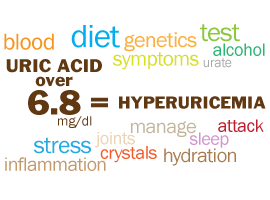Hyperuricemia is the medical term for an abnormal amount of uric acid in the blood. It can develop as a result of not enough uric acid being passed in the urine, overproduction of uric acid, or a combination of the two. But for 80% to 90% gout sufferers, not enough uric acid being passed is the primary cause of elevated levels of uric acid in the blood. People with gout pass approximately 40% less uric acid than patients without gout.

Hyperuricemia by itself does not cause gout, the blood may not even be hyperuricemic during an acute gout attack. But most people with gout have hyperuricemia at some time during the course of the disease. Also, having hyperuricemia alone does not mean that a person will get gout – in fact most with hyperuricemia do not develop gout.